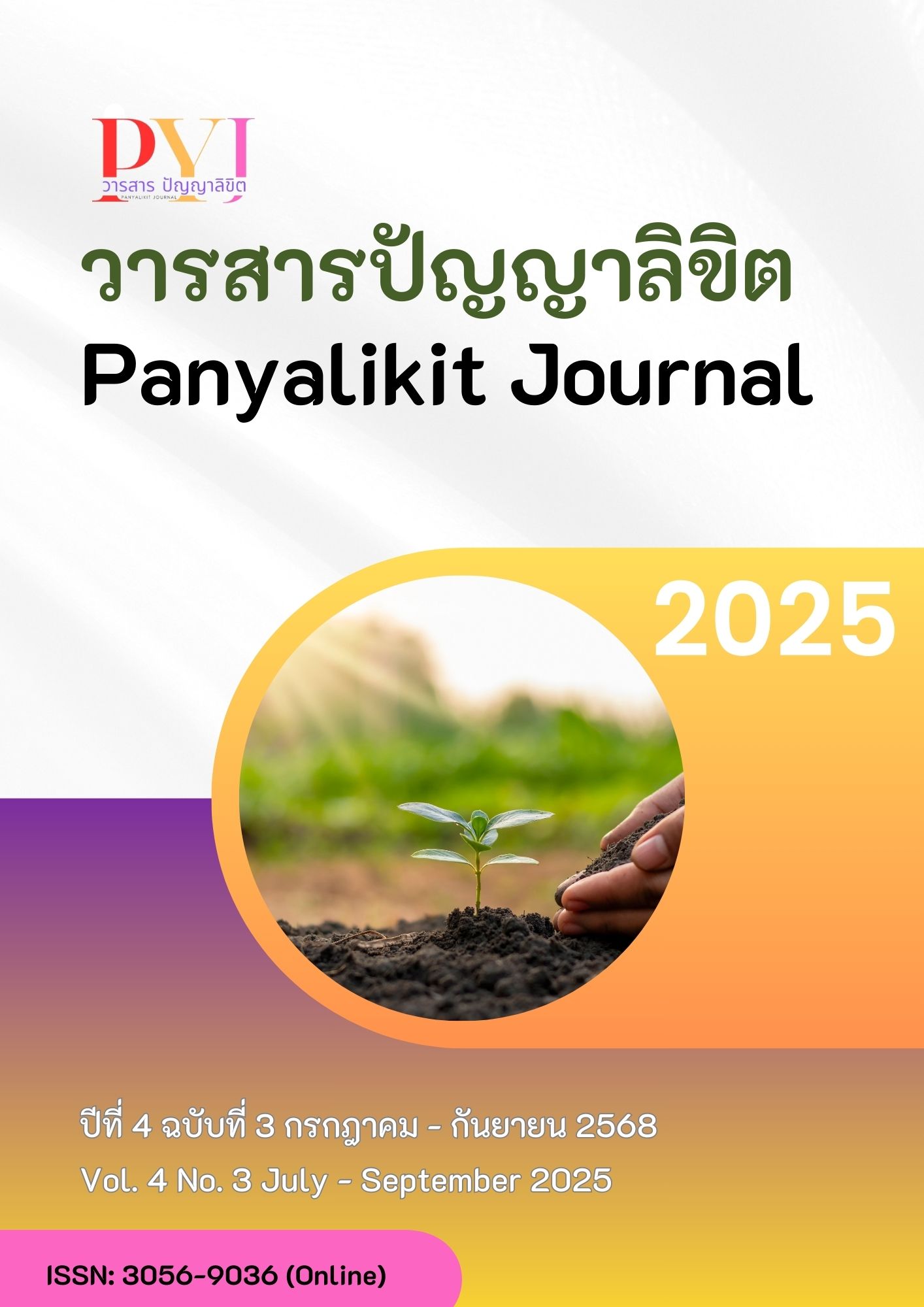ผลกระทบของการมีความรับผิดชอบต่อสังคมต่อพฤติกรรมการเป็นพนักงานที่ดี: หลักฐานจากธุรกิจโรงแรมในมณฑลกวงซี ประเทศจีน
Main Article Content
บทคัดย่อ
บทความวิจัยนี้มีวัตถุประสงค์เพื่อศึกษาผลกระทบของกลยุทธ์ความรับผิดชอบต่อสังคมที่มีต่อพฤติกรรมการเป็นพนักงานที่ดี โดยประยุกต์ใช้กระบวนการวิจัยเชิงปริมาณ กลุ่มตัวอย่างที่ใช้ในการวิจัยคือพนักงานโรงแรมในเมืองหลิวโจว มณฑล กวงซี จำนวน 257 คน ซึ่งได้รับการเลือกโดยใช้เทคนิคการสุ่มตัวอย่างแบบแบ่งชั้นภูมิ เก็บรวบรวมข้อมูลโดยใช้แบบสอบถาม และวิเคราะห์ข้อมูลโดยใช้สมการถดถอยพหุคูณ ผลการวิจัยพบว่าความรับผิดชอบต่อสังคมของธุรกิจโรงแรมมีการดำเนินงานในระดับมากทั้ง
5 ด้าน และพบว่าพนักงานมีพฤติกรรมการเป็นพนักงานที่ดีในระดับมากทุกด้าน ผลจากการทดสอบสมมติฐานพบว่า ความรับผิดชอบต่อสังคมมีผลกระทบเชิงบวกต่อพฤติกรรมการเป็นพนักงานที่ดีอย่างมีนัยสำคัญ (B = 0.314, p < 0.01) โดยเฉพาะความรับผิดชอบต่อพนักงาน (B = 0.652, p < 0.01)
และความรับผิดชอบต่อชุมชน (B = 0.470, p < 0.01) อย่างไรก็ตาม ความรับผิดชอบต่อผู้จำหน่ายวัตถุดิบมีผลกระทบเชิงลบต่อพฤติกรรมการเป็นพนักงานที่ดี (B = -0.698, p < 0.01) ส่วนความรับผิดชอบต่อลูกค้าและความรับผิดชอบต่อสิ่งแวดล้อมไม่มีผลกระทบอย่างมีนัยสำคัญ (p > 0.05) ผลการวิจัยชี้ให้เห็นว่าผู้ประกอบการโรงแรมควรมุ่งเน้นการพัฒนานโยบายและกลยุทธ์ด้านความรับผิดชอบต่อพนักงานและด้านความรับผิดชอบต่อชุมชน เพื่อส่งเสริมพฤติกรรมการเป็นพนักงานที่ดีในอุตสาหกรรมโรงแรม นอกจากนี้ ผลการวิจัยได้ช่วยเติมเต็มองค์ความรู้เกี่ยวกับความสัมพันธ์ระหว่างกลยุทธ์ความรับผิดชอบต่อสังคมกับพฤติกรรมการเป็นพนักงานที่ดีในบริบทอุตสาหกรรมโรงแรมซึ่งยังมีงานวิจัยที่ศึกษาค่อนข้างจำกัด
Article Details

อนุญาตภายใต้เงื่อนไข Creative Commons Attribution-NonCommercial 4.0 International License.
เอกสารอ้างอิง
Alyahia, M., et al. (2024). Greenwashing Behavior in Hotels Industry: The Role of Green Transparency and Green Authenticity. Sustainability, 16(3), 1050.
Ali, H., Yin, J., Manzoor, F., & An, M. (2023). The impact of corporate social responsibility on firm reputation and organizational citizenship behavior: The mediation of organic organizational cultures. Frontiers in Psychology, 13, 1100448.
Ashour, M. L., Ali, N. N., & Allan, M. S. (2020). Corporate social responsibility and competitive advantage: Relationships and mechanisms. International Journal of Economics and Business Administration, 8(3), 161–175.
Blau, P. M. (1964). Exchange and power in social life. New York: Routledge.
Choi, J., Sohn, Y. W., & Lee, S. (2020). The Effect of Corporate Social Responsibility on Employees' Organizational Citizenship Behavior: A Moderated Mediation Model of Grit and Meaning Orientation. Sustainability, 12(13), 5411.
Erbir, M. & Yılmaz, A. (2022). The effect of the corporate social responsibility perceptions and organizational citizenship behaviors of employees working ın public-private model health care ınstitutions on their ıntrapreneurship tendencies. Hacettepe Sağlık İdaresi Dergisi, 25(4), 707-724.
Farrington, T., et al. (2017). Corporate social responsibility: Reviewed, rated, revised. International Journal of Contemporary Hospitality Management, 29(1), 30–47.
Fatima, T., & Elbanna, S. (2023). Corporate social responsibility (CSR) implementation: A review and a research agenda towards an integrative framework. Journal of Business Ethics, 183(1), 105–121.
Freeman, R. E. (1984). Strategic management: A stakeholder approach. Boston: Pitman.
Freire, C., Gonçalves, J., & Carvalho, M. R. (2022). Corporate social responsibility: The impact of employees’ perceptions on organizational citizenship behavior through organizational identification. Administrative Sciences, 12(3), 120, 1-18.
He, J., Zhang, H., & Morrison, A. M. (2019). The impacts of corporate social responsibility on organizational citizenship behavior and task performance in hospitality: A sequential mediation model. International Journal of Contemporary Hospitality Management, 31(6), 2580–2596.
Jin, H., Li, X., & Li, G. (2024). Impact of corporate social responsibility on employee loyalty: Mediating role of person-organization fit and employee trust. PLoS ONE, 19(3), 0300933.
Khatter, A. (2025). Challenges and Solutions for Corporate Social Responsibility in the Hospitality Industry. Challenges, 16(1), 9.
Li, W. (2022). Prediction of tourism demand in Liuzhou region based on machine learning. Mobile Information Systems, 2022, Article ID 9362562, 1-9.
Li, Y., & Chen, C.-H. (2023). The impact of employee-perceived CSR on organizational citizenship behavior: Evidence from China. Asia Pacific Management Review, 28(4), 487–500.
Macassa, G., et al. (2021). Corporate social responsibility and internal stakeholders’ health and well-being in Europe: A systematic descriptive review. Health Promotion International, 36, 866–883.
Madanaguli, A. R., Dhir, A., Kaur, P., Mishra, S., & Srivastava, S. (2023). A systematic literature review on corporate social responsibility (CSR) and hotels: Past achievements and future promises in the hospitality sector. Scandinavian Journal of Hospitality and Tourism, 23(2-3), 141-175.
Militar, L. A. (2023). Engagement and Corporate Social Responsibility of Hotel Employees in Bacolod City: A Mixed Method Study. International Multidisciplinary Journal of Research for Innovation, Sustainability and Excellence (IMJRISE), 2(2), 167–178.
Moyeen, A., & Mehjabeen, M. (2024). CSR research in the hotel industry: How it relates to promoting the SDGs. Social Responsibility Journal, 20(9), 1770–1786.
Ni, J. (2024). The hotel industry in China: Overview, observations, and future prospects of 5-star properties within the Chinese hotel industry. Highlights in Business, Economics and Management, 41, 579–583.
Organ, D. W. (1988). Organizational citizenship behavior: The good soldier syndrome. Lexington, MA: Lexington Books.
Pedhazur, E. J., & Schmelkin, L. P. (1991). Measurement, design, and analysis: An integrated approach. New York: Psychology Press.
Porter, M. E., & Kramer, M. R. (2011). Creating shared value. Harvard Business Review, 89(1/2), 62–77.
Rovinelli, R. J., & Hambleton, R. K. (1977). On the use of content specialists in the assessment of criterion-referenced test item validity. Dutch Journal of Educational Research, 2(2), 49-60.
Singh, V., Tariyal, A., Roy, S., & Bisht, S. (2024). Unpacking the link between corporate social responsibility, employee engagement, autonomy, and creativity in hotel industry. In S. M. Verma et al. (Eds.), Proceedings of the 9th International Conference on Synergizing Sustainable Technologies and Management Practices (STAMP 2024) (pp. 363–374). Advances in Economics, Business and Management Research, 321.
Soliman, S. G. S., & Saad, S. (2021). Impact of corporate social responsibility on employee organizational citizenship behavior in Egyptian hotels. Journal of Association of Arab Universities for Tourism and Hospitality (JAAUTH), 20(1), 220–235.
Wang, C., Hu, R., & Zhang, T. (2020). Corporate social responsibility in international hotel chains and its effects on local employees: Scale development and empirical testing in China. International Journal of Hospitality Management, 90, 102598. 1-14.
Wei, S.Y., & Lin, L.W. (2021). The impact of CSR fulfillment on corporate performance in China. Revista Argentina de Clínica Psicológica, 30(1), 192–203.
Youn, H., & Kim, J.H. (2022). Corporate social responsibility and hotel employees’ organizational citizenship behavior: The roles of organizational pride and meaningfulness of work. Sustainability, 14(2428), 1-18.
Yuan, S. (2020, November 10). Liuzhou focuses on improving its impressive industrial tourism. China Daily Hong Kong. Retrieved June 1, 2025, from https://www.chinadailyhk.com/hk/article/ 148930?showpdf=true
Zeng, J. (2024). Corporate social responsibility in China: A tool of policy implementation accounting, economics, and law: A convivium. Retrieved August 5, 2024, from https://doi.org/10.1515/ael-2022-0085.
Zhang, J., Tan, Y., Chen, J., & Jiang, Y. (2024). Effects of corporate social responsibility (CSR) policies and activities on company reputation and employee organizational citizenship behaviour: Evidence from the tourism industry. SHS Web of Conferences, 181, 04027. 1-7.
Zheng, X., & Li, W. (2024). Government environmental attention and enterprise greenwashing behavior: evidence from China. Journal of Asian Business and Economic Studies, 31(5), 392–403.


